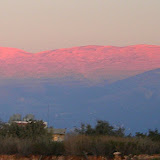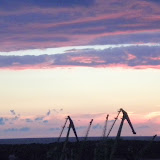Though it is not easy to keep up with the demand for "more," in this case, unlike the master in Oliver Twist's orphanage, "More, please!" will be rewarded.
When you travel, if you do not think about recording some of the things that, at first impression, are different when they are first impressions, it is easy to forget them and to begin to accept them. Of course, eventually, I must accept them all. I cannot change much about the way life works in Lebanon. People are amazingly versatile and adaptable, as we saw, over and over during the natural disasters we've watched in Haiti, Chile, Pakistan to name only 3. Of course, I am not classifying any of this as a "disaster" really, though it has seemed so at times.
Electricity
I read before I came that the electrical grid here was very unstable. That's not true! It's very stable. It goes off on intermittently but very regularly. Some say you can set your watch by it. In other words, there is not enough electricity to go around so the company has planned blackouts for 3 hours at various times during the day throughout the country, region by region. I remembered about this my first night when the lights and everything went off at midnight and then came back on a minute later because of the university generators. So, what folks are not paying in electricity, they are paying in diesel to run their generators. Most hotels, malls, public buildings and many apartment complexes and private homes have generators that kick on when the power dies. My first day, I found myself in a bookstore, looking at the English book collection when the lights went off. No one panics; instead, everyone continues to shop as best they can in the dark. I couldn't read titles until the lights came back on. It was merely a temporary nuisance in a mall with a generator. This electrical issue is a result of the last war when all the power plants were bombed, 2006. The country is struggling to get everything working again, years later. This habitual loss of power makes me think about things I wouldn't otherwise:
- Caught in the spice aisle of the supermarket, I thought, "This is a great place to be right now, where the print is tiniest and all in Arabic or French." There was no way to continue until the lights came on several minutes later.
- There is no point in digital clocks. The one on the microwave rarely gets beyond 9:30 before beginning over again at 1:30. I've been using my cell phone for an alarm clock.
- What is the cost of diesel compared with electrical units?
CNN, just last night, had this topic featured on their "Connect The World" program, Becky Anderson. They are discussing languages that are being lost with this one, Lebanese Arabic, featured as one of them. The reason this is unique in the Arab world is because of the cosmopolitan nature of the country, Beirut especially. Many people, probably a majority are bilingual or trilingual and many parents speak to their children in French. The standard greetings and polite exchanges are often in English, "Hello, Hi" rather than "Marhaba" or "Sabachel Kheir." "Merci" rather than "Shukrahn." I had read this before coming--that the French and English borrowings were now a standard part of everyone's language but I couldn't have imagined the extent to which this was true. It is strange to hear Arabic and French mixed together. I suppose I'll get used to it and then accept it, and then wonder why my friends in Jordan don't sound the same! The polyglot spaghetti that inhabits my brain is only going to get worse, I fear. Nevertheless, I will study Arabic again because Tripoli, the next closest city is more Arab than anything else and though many signs are written in English and French, in this part of Lebanon a great many are not.
Hot Water
I was without hot water in the apartment for about 4-5 days. No one told me that there was a special technique for getting hot water until the Facilities Manager came by to go through the apartment and address my questions. He opened the fuse box and there, clearly labeled, was the word "Boiler." 20 minutes or more before you need it, you flip the switch, use it, and then remember to turn it off because it uses (gas? electricity? some unnamed energy?) a great deal of energy to keep it hot. Then, I remembered the Jordan hot water drill. The difference this time is that "on" and "off" are clearly labeled. In Jordan there was a 2-switch process and I never, ever figured out. I always thought it was kind of like magic to have hot water at all!
The Oven
The stove is a gas stove, needing matches for each time you light the oven. The burners have an ignition spark that lights the gas. I have lit the oven. That is not the problem. The issue is this: There are no temperature numbers nor is there a setting that uses even heat, top and bottom at the same time. The oven is either high, low, on, off, top to broil, or bottom. That is all. I have eaten dried chicken (that wasn't supposed to be dry), and baked a pizza crust for a family who is still stuck in a hotel for the next 2 more weeks, that was not done on top but starting to burn on the bottom. I found a counter-top oven in my travels with my friend for $50 but I am going to keep trying to figure this oven out. I do think souffle is definitely not on any menu anytime soon. So far it hasn't singed my hair off or blown up like the oven in Jordan did.
My office
Ugh! It is half of a tiny, claustrophobic, rather untidy and seemingly dingy room. I do not plan to spend much time in it--just what's required. Perhaps I will find a quiet, peaceful place to work and meet students, a recommendation from a friend who'd resolved her own office issues that way. Living on campus will be a huge benefit in this case. The steep side of the mountain that I will climb at least once a day will be good, aerobic exercise and make my sisters happy! Today I was almost wheezing as I went up. It was humid, warm, and the climb tough. However, it is not long, so that's good.
Notes about several things
- My shipping has arrived and I did not think it was very expensive--certainly not as expensive, including the transportation here, as the nightmares I was having about it that were waking me up or keeping me awake.
- I still do not have a syllabus for either class I will teach. A team meeting for one of the classes will be next Wednesday and the other, in a week, the Friday before classes start. Lord, give me patience!
- The wonderful women I met a week ago now have continued to help. One of them, after driving me around for several hours to see televisions and irons, gave me a tv they were no longer using which is just fine and is now connected to even more channels in English than I had before. She also gave me a medium-sized travel iron that, with steam, does a fine job. This is good because the washing machine (no, this one does not dance like the one in Jordan did) has a special spin cycle that is particularly good at wrinkling clothes. I am not sure what causes this but there is not one thing, other than towels (yes, I have those too), and underwear that doesn't need ironing.
- Facebook and Twitter--Facebook is blocked during school hours, 8-5; Twitter is blocked completely. Skype is also blocked for everyone unless you write a letter requesting the service and stating the reasons for needing it. Then, it is usually limited to after-school hours but I requested it 24/7 and they've honored that. I have also noticed that some live-stream radio is impossible at any time. However, I can get PRN, NET, and KQED among others so I am not missing anything. Fortunately, the blog still works.
Geri









